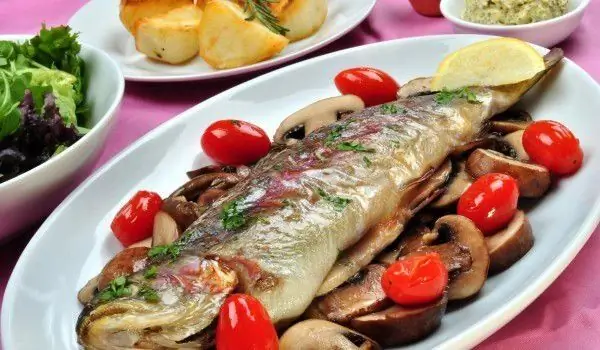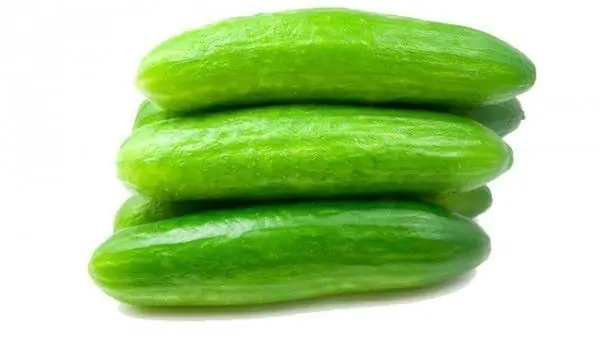2025 Author: Jasmine Walkman | [email protected]. Last modified: 2025-01-23 10:18
Sea cucumbers / Ecballium elaterium / is a perennial herbaceous plant of the Pumpkin family. The herb is also known as wild cucumber, mad cucumber, tsarkalo, wild pipon, dog melon and others.
The plant develops a vertical spindle-shaped root. The stem is one meter long, lying or erect, succulent, covered with rough hairs. The flowers are pale yellow, unisexual, gathered in racemes.
The sepals are 5. The petals are also 5, pale yellow, with 3-4 green veins, densely fibrous on the outside. The fruit is green, yellowing when ripe, elliptical, covered with bristles, with numerous seeds. It has the shape and size of a large olive.
The plant blooms from May to July. The homeland of sea cucumbers is the Mediterranean, but the herb also grows in Asia Minor and Europe. In our country the medicinal plant grows in sandy and weedy places.
It is possible to notice it on the Black Sea coast and in areas of the Danube plain. It is also found in the Thracian lowlands (around Plovdiv), the Eastern Rhodopes.
History of sea cucumbers
These plants are called crazy cucumbers, because when ripe they rise in pressure and at the slightest touch they break off, and from the hole at the site of the stalk juices fly out, and often a seed, whose reactive force causes the cucumber to fly away, tossing. se.
From ancient times the juice of sea cucumbers used externally as an herbal medicine. It is mainly used for its cleansing and anti-inflammatory action. Of course, in the past people have identified the damage from the plant and have been careful when using it.
Composition of sea cucumbers
The herb contains glucosides and beta-elaterin, which has a bitter taste. The plant also contains acids, elaterase, resins and proteins.
Elaterin acts as a strong laxative, but is not found in ripe fruits. The aerial part of the plant also contains vitamins and alkaloids.

Collection and storage of sea cucumbers
The unripe fruits / Fructus Elaterii, Fructus Ecbalii / of sea cucumbers are mainly used. The fruits are picked before they are fully ripe from September to October.
If the fruit will produce juice, it is transmitted in a fresh state. Otherwise, the fruit is dried. The fruits of the herb are dried in the shade or in an oven at a temperature of up to 45 degrees.
The dried fruits are dark green, odorless and have a bitter taste. The permissible humidity is 13%. The dried drugs are packed in bags. Store in a dry and ventilated room. For easier drying, some herbalists string the fruit on a string. From 12 kg of fresh fruit 1 kg of dry is obtained.
Benefits of sea cucumbers
The plant has a revulsive, diuretic, choleretic and antirheumatic effect. Internally used as a strong cleanser. The drug helps with kidney disease, paralysis, rheumatism, edema with fluid retention, jaundice, drug poisoning, viral hepatitis, and Botkin's disease.
Externally, the herb is used revulsively for neuralgia, joint inflammation, sinusitis, sciatica, chronic rhinitis, as well as abscesses and pain. The plant also has a dehydrating and anti-inflammatory effect.
Folk medicine with sea cucumbers
The plant has a laxative and analgesic effect. Bulgarian folk medicine recommends sea cucumbers as a remedy for neurasthenia, scarlet fever and fever. Externally, the fruits of the herb are used pre-soaked in brandy to spread for rheumatism, sciatica and hemorrhoids. Fruits cooked in salted water are taken by sniffing for jaundice and sinusitis.
If you want to get rid of sinusitis forever, drops of sea cucumber juice will help, and the effect will be felt almost immediately.
Sea cucumber should have ripened in mid-August. The ripe cucumber bounces when touched by spraying seeds and liquid. It can be collected with a plastic cup of coffee so as not to lose the contents. Strain and with a dropper from the liquid pour half a pipette into the nostril.
In the fight against insidious sinusitis, inhalation of sea cucumbers in combination with other herbs is a proven cure. Prepare a solution by cutting 2 pieces of sea cucumber into pieces. To them add 5 grains of ground black pepper and 100 g of dried drug from Rooster's comb. The mixture is boiled in 1 liter of water and then the vapor is inhaled with a funnel through the nostrils. The procedure is done until the secretion runs out.
Another folk recipe against sinusitis recommends powdered fruit from sea cucumbers to be applied to the nose through a cotton swab, inhaling sharply and briefly. Soon a leak starts from the nose and it clears.
The powder is prepared by drying the fruit well in an oven (without burning it), grinding it with a coffee machine and sifting it. The amount of lentils is taken from the powder. The procedure is repeated 1-2 times a day. If burning or irritation of the throat is felt, gargle and spit out. The powder can also be found in herbal pharmacies.

A decoction of the herb against sinusitis is prepared by crushing a sea cucumber and boiling it for 10 minutes in 500 ml of water. Strain the decoction and add half a teaspoon of salt, which must be well dissolved. The liquid is inhaled and spat out. The procedure is done every 15 days.
Bulgarian folk medicine recommends the following recipes with sea cucumbers against arthritis:
Several cucumbers are placed in brandy and stay in the sun for 25 days. The resulting mixture is filtered and smeared on the affected areas.
Mix 200 ml of burning alcohol, 700 ml of gas, 600 ml of iodine and 20 sea cucumbers. The mixture stays for 20 days. Then it is applied to the affected areas and warmed.
For chicken thorn our folk medicine recommends the following recipe:
The chicken thorn is pierced with a needle and a drop of sea cucumber juice is dripped, being very careful not to drip it aside because it burns the skin.
Harm from sea cucumbers
Be careful when using sea cucumbers and do not apply the herb without medical supervision. As the drug is poisonous, it should be used internally in very small doses. Caution is also needed when applying the plant externally, as a possible overdose can cause skin corrosion.
Consumption of fresh juice in a dose of more than 0.6 g internally can cause severe and even fatal poisoning. In addition to being poisonous, sea cucumber juice is dangerous to the eyes.
Recommended:
Sea Bream, Sea Bass Or Trout To Choose?

Without a doubt, seafood is delicious and healthy. However, when it comes to choice of fish , we begin to wonder which one to choose. The criteria can be many, but usually the most important is the price of the fish and its size. In this article we will introduce you to the pros and cons of three favorite fish - bream, sea bass and trout, so you can more easily make your choice.
Cucumbers

Cucumbers are one of the oldest vegetable species grown in our country. Cucumber is an annual plant belonging to the Pumpkin family. It contains seeds and is actually a fruit, but due to its slightly bitter and sour taste it is grouped to vegetables.
No Dangerous Cucumbers On The Bulgarian Market

There are no infected cucumbers on the Bulgarian market so far. This is guaranteed by the chairman of the State Commission on Commodity Exchanges and Markets Eduard Stoychev, quoted by bTV. The inspections were initiated as a result of the tragic incidents in which 7 people died after eating cucumbers in Germany.
Cucumbers - Ideal For Weight Loss

It is known that cucumbers lose weight easily. They are ideal for supplementing any diet, are low in calories and can be consumed in virtually unlimited quantities. One kilogram of cucumbers equals 135 calories and 950 ml of water. Cucumbers have been used since ancient times and as a cosmetic.
Superfoods: Sea Cucumbers (Sea Ginseng)

Sea cucumbers are a type of marine mollusk with rather tough skin that contains limestone deposits. Their appearance resembles a cucumber and from this resemblance derives their name. In ancient China they received the name Sea ginseng as their healing effect was valued as much as that of ginseng.

